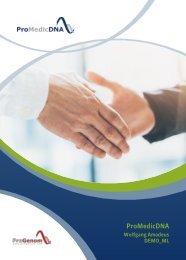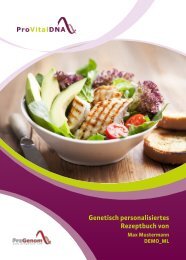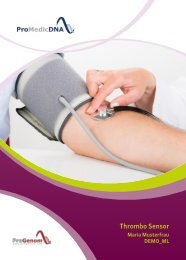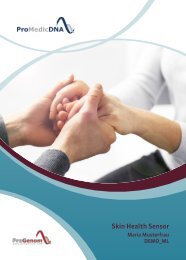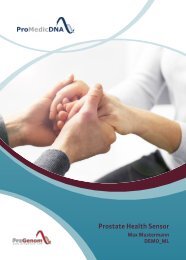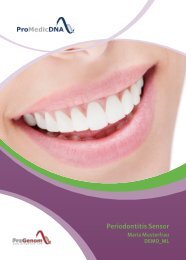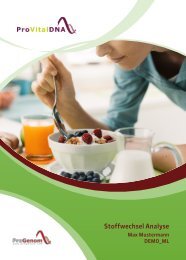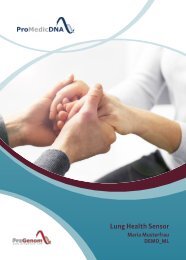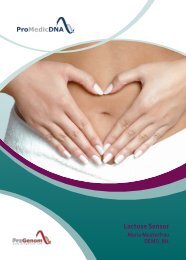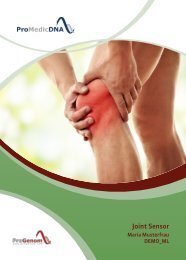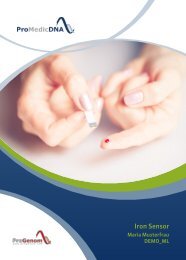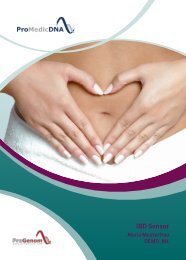- Page 1 and 2:
Lifestyle genetic analysis Maria Mu
- Page 3 and 4:
Lifestyle genetic analysis Personal
- Page 5 and 6:
BODY WEIGHT GENES An analysis and l
- Page 7 and 8:
physical activity / calorie reducti
- Page 10 and 11:
BODY WEIGHT GENES YOUR NUTRITION TY
- Page 12 and 13:
ANALYSIS OF TYPE Carbohydrate or fa
- Page 14 and 15:
Diet: Balanced diet: carbohydrates
- Page 16 and 17:
Your Type: MODERATE CALORY INTAKE T
- Page 18 and 19:
BODY WEIGHT GENES YOUR NUTRITION TY
- Page 20 and 21:
ANALYSIS OF STRATEGY Muscles, calor
- Page 22 and 23:
BODY WEIGHT GENES YOUR NUTRITION TY
- Page 24 and 25:
SETTING GOALS Your genetic weight l
- Page 26 and 27:
NUTRITION Dieting rules Can I cheat
- Page 28 and 29:
- - NutriMe Weight Management Your
- Page 30 and 31:
WEIGHT ICONS Losing weight with the
- Page 32 and 33:
- - Cookbook Menu plans and recipes
- Page 34 and 35:
- - The Menu Portal What it contain
- Page 36 and 37:
LOSING WEIGHT WITH THE HELP OF THE
- Page 38 and 39:
Step 3) How do you follow these gui
- Page 40 and 41:
Step 6) How does the food item syst
- Page 42 and 43:
LOSING WEIGHT WITH THE HELP OF THE
- Page 44 and 45:
Menu plan: Traditional Meal Item We
- Page 46 and 47:
Menu plan: Italian Meal Item Weight
- Page 48 and 49:
Menu plan: Oriental Meal Item Weigh
- Page 50 and 51:
Snacks, that can be eaten any time
- Page 52 and 53:
Snacks, that can be eaten any time
- Page 54 and 55:
Snacks, that can be eaten any time
- Page 56 and 57:
BODY WEIGHT GENES YOUR NUTRITION TY
- Page 58 and 59:
EXERCISE Exercise The goal of aerob
- Page 60 and 61:
Example of a training plan with 3 s
- Page 62 and 63:
Leisure activities and housework Tr
- Page 64 and 65:
EXERCISE Adjustment phase and stabi
- Page 66 and 67:
Leisure activities and housework Tr
- Page 68:
Determining your optimal heart rate
- Page 71 and 72:
NUTRITION GENES How your genes infl
- Page 73 and 74:
Your Result RESULT You have chosen
- Page 75 and 76:
Nutritional Genes - Milk SYMBOL rs
- Page 77 and 78:
FOOD INGREDIENTS The effects of ind
- Page 79 and 80:
NUTRIGENETICS Nutritional Genes - H
- Page 81 and 82:
NUTRIGENETICS Nutritional Genes - V
- Page 83 and 84:
Nutritional Genes - Oxidative Stres
- Page 85 and 86:
NUTRIGENETICS Nutritional Genes - B
- Page 87 and 88:
NUTRIGENETICS Nutritional Genes - B
- Page 89 and 90:
NUTRIGENETICS Nutritional Genes - C
- Page 91 and 92:
NUTRIGENETICS Nutritional Genes - E
- Page 93:
Summary ß-carotene ß-Carotene ß-
- Page 97:
Summary Magnesium Magnesium Magnesi
- Page 101:
Summary Oxalic acid Oxalic a. Oxali
- Page 105:
Summary Lactose Lactose Lactose Lac
- Page 109 and 110:
Alcohol Alcohol is a substance that
- Page 111 and 112:
Sucrose This sugar contains calorie
- Page 113 and 114:
TABLE How food types are evaluated
- Page 115 and 116:
and accurate list of ingredients. A
- Page 117 and 118:
DIETARY SUPPLEMENT This chapter des
- Page 119 and 120:
This chart shows the shortage of im
- Page 122 and 123:
BODY WEIGHT GENES YOUR NUTRITION TY
- Page 124 and 125:
EPIGENETICS Epigenetics - Regulatio
- Page 126 and 127:
How one's lifestyle can affect epig
- Page 128 and 129:
BODY WEIGHT GENES YOUR NUTRITION TY
- Page 130 and 131:
METABOLISM Phase 1 Detoxification f
- Page 132 and 133:
METABOLISM Oxidative stress and fre
- Page 134 and 135:
METABOLISM Substances and risks Eve
- Page 136 and 137:
Nutritional Genes - Oxidative Stres
- Page 138 and 139:
METABOLISM Prevention PHASE 2 DETOX
- Page 140 and 141:
BODY WEIGHT GENES YOUR NUTRITION TY
- Page 142 and 143:
Telomeres and biological age BIOLOG
- Page 144 and 145:
adapted diet as best as possible. Y
- Page 146 and 147:
BIOLOGICAL AGE Prevention What can
- Page 148 and 149:
BODY WEIGHT GENES YOUR NUTRITION TY
- Page 150 and 151:
STRESS AND BURNOUT SYNDROME Stress
- Page 152 and 153:
STRESS Genes relevant to stress Sev
- Page 154 and 155:
Lack of close, supportive relations
- Page 156 and 157:
How you should exercise Exercise re
- Page 158 and 159:
BODY WEIGHT GENES YOUR NUTRITION TY
- Page 160 and 161:
Athletics gene 1 (ACTN3 SNP rs18157
- Page 162 and 163:
Summary of the genetic predispositi
- Page 164 and 165:
VO2max Maximal oxygen uptake Cells
- Page 166:
VO2max Result OXYGEN UPTAKE (VO2max
- Page 169 and 170:
OXIDATIVE STRESS Athletes produce c
- Page 171 and 172:
Summary of effects ➤ You have a s
- Page 173 and 174:
INFLAMMATORY RESPONSE AND INJURY Ce
- Page 175 and 176:
Summary of effects ➤ The aggressi
- Page 177 and 178:
RECOVERY PHASE This chapter gives y
- Page 180 and 181:
BODY WEIGHT GENES YOUR NUTRITION TY
- Page 182 and 183:
CALORIES Ideal calorie distribution
- Page 184 and 185:
CALORIC DISTRIBUTION Your optimal c
- Page 186 and 187:
the order form and no genes are tes
- Page 188 and 189:
SCHEDULE The schedule of the perfor
- Page 190 and 191:
COMPETITIONS Competition diet The d
- Page 192:
Strategic plan for your athletic ca
- Page 195 and 196:
FOOD LIST This individual food list
- Page 197 and 198:
Green apple icons Green apple icons
- Page 200:
g per item F Recommendations to los
- Page 204:
g per item F Recommendations to los
- Page 208:
g per item F Recommendations to los
- Page 212:
g per item F Recommendations to los
- Page 216:
g per item F Recommendations to los
- Page 220:
g per item F Recommendations to los
- Page 224:
g per item F Recommendations to los
- Page 228:
g per item F Recommendations to los
- Page 232:
g per item F Recommendations to los
- Page 236:
g per item F Recommendations to los
- Page 240:
g per item F Recommendations to los
- Page 244:
g per item F Recommendations to los
- Page 248:
g per item F Recommendations to los
- Page 252:
g per item F Recommendations to los
- Page 256:
g per item F Recommendations to los
- Page 260:
g per item F Recommendations to los
- Page 264:
g per item F Recommendations to los
- Page 268: g per item F Recommendations to los
- Page 272: g per item F Recommendations to los
- Page 276: g per item F Recommendations to los
- Page 280: g per item F Recommendations to los
- Page 284: g per item F Recommendations to los
- Page 288: g per item F Recommendations to los
- Page 293 and 294: BODY WEIGHT GENES YOUR NUTRITION TY
- Page 295 and 296: SCIENCE The science of genes and ex
- Page 297 and 298: Statement 4 Genes influence how our
- Page 299 and 300: Weight loss program FABP2 - Fatty a
- Page 301 and 302: ADRB2 adrenoceptor beta 2, surface
- Page 303 and 304: APOA5 - Apolipoprotein A-V (rs66279
- Page 305 and 306: Shiwaku K, Nogi A, Anuurad E, Kitaj
- Page 307 and 308: ➤ GFHEV-Leitlinien. ➤ Gidh-Jain
- Page 309 and 310: SCIENCE Epigenetics ➤ AAPS J. 201
- Page 311 and 312: Detoxification SCIENCE CYP1A1 - Cyt
- Page 313 and 314: GSTT1 - glutathione S-transferase t
- Page 315 and 316: COMT - Catechol-O-methyltransferase
- Page 317: PPARG (rs1801282) RES Genotype POP
- Page 321 and 322: Maximal oxygen uptake (VO2max) Nucl
- Page 323 and 324: CRP - C-Reactive Protein (rs3093066
- Page 325 and 326: GSTT1 - glutathione S-transferase t
- Page 327 and 328: SCIENCE Inflammation and risk of in
- Page 329 and 330: IL6R - interleukin 6 receptor (rs22
- Page 331 and 332: BODY WEIGHT GENES YOUR NUTRITION TY
- Page 333 and 334: - - NutriMe Complete How it works E
- Page 335 and 336: - - Optimized absorption into the b
- Page 337 and 338: - - NutriMe Complete - Proper care
- Page 339 and 340: - - NutriMe Complete - The highest
- Page 341 and 342: - - Effect of your individual micro
- Page 343 and 344: - - Your daily requirement of micro
- Page 345 and 346: - - Follow us on facebook! Follow u
- Page 347 and 348: VERSION HISTORY Science continues t
- Page 349 and 350: ➤ V455 - Layout improvements, Des
- Page 351 and 352: CUSTOMER SERVICE Customer Service Q
- Page 353 and 354: NOTES:
- Page 355: 0000000000000 Lifestyle genetic ana




